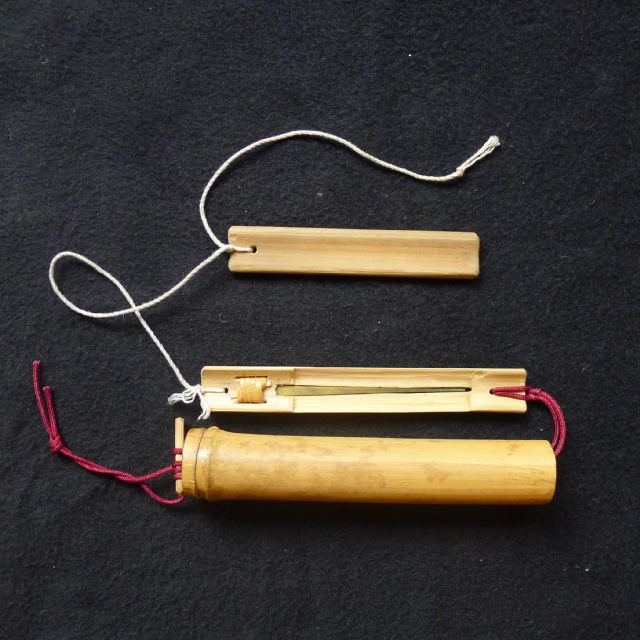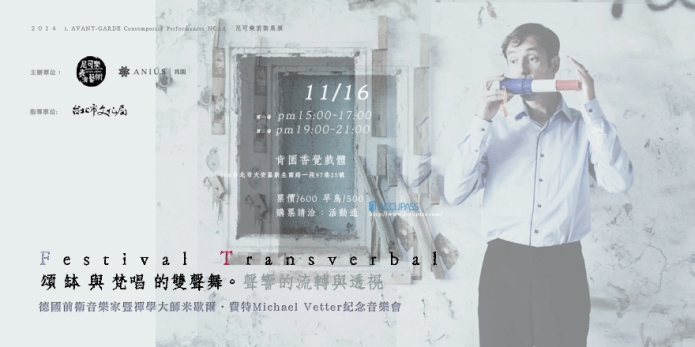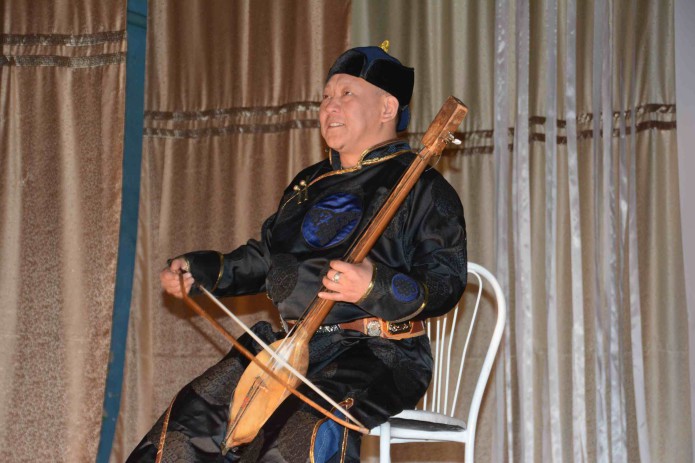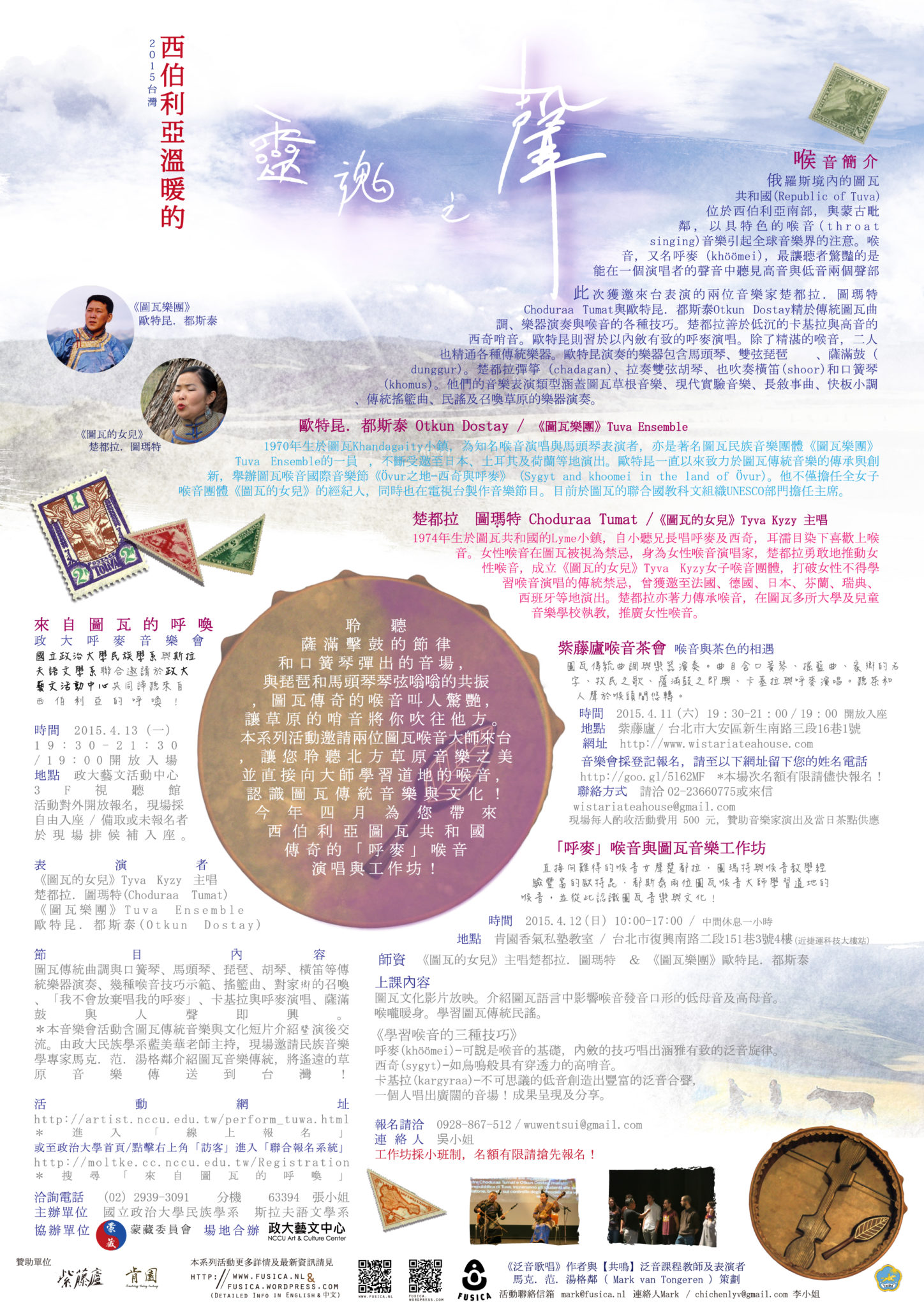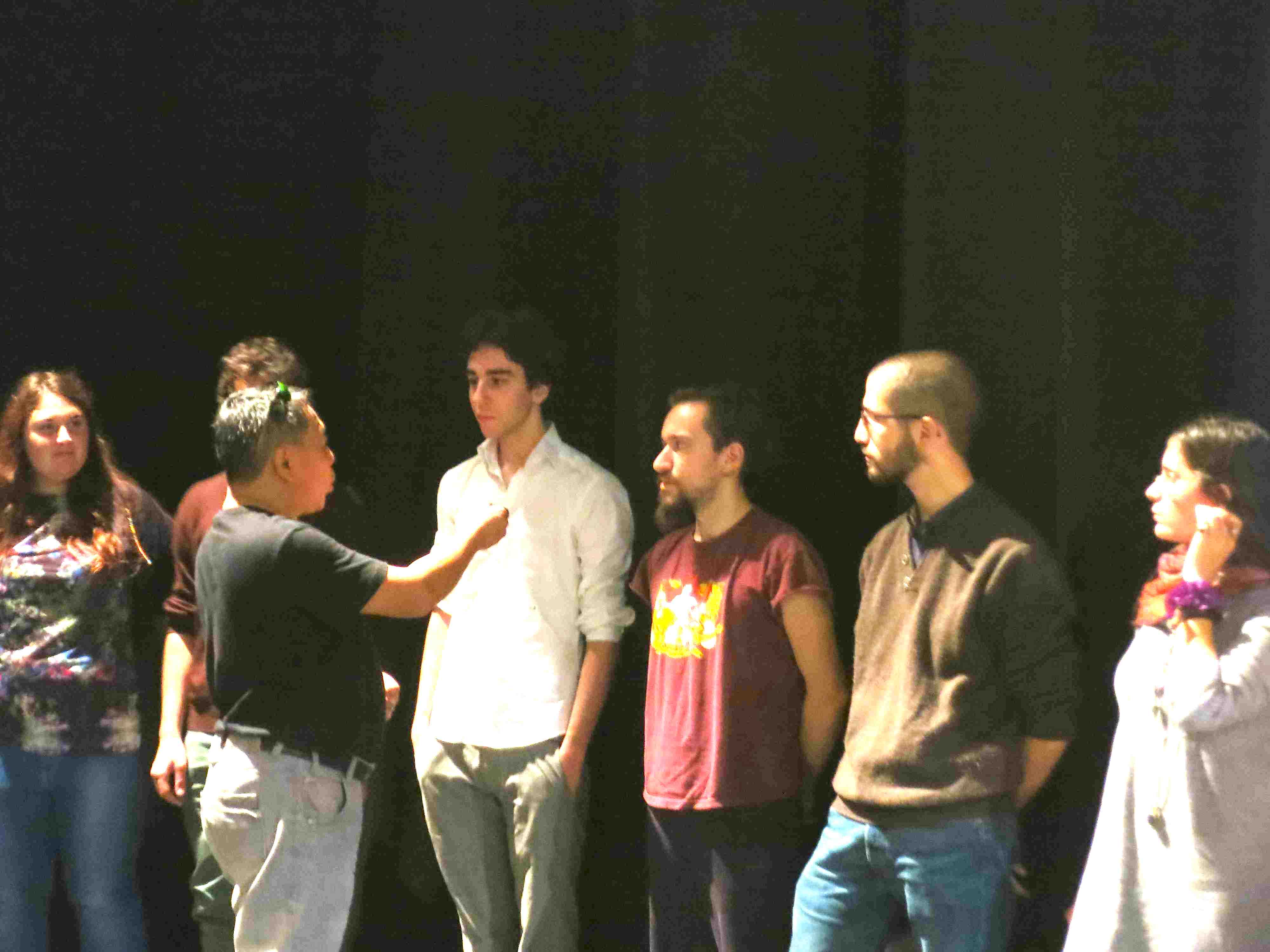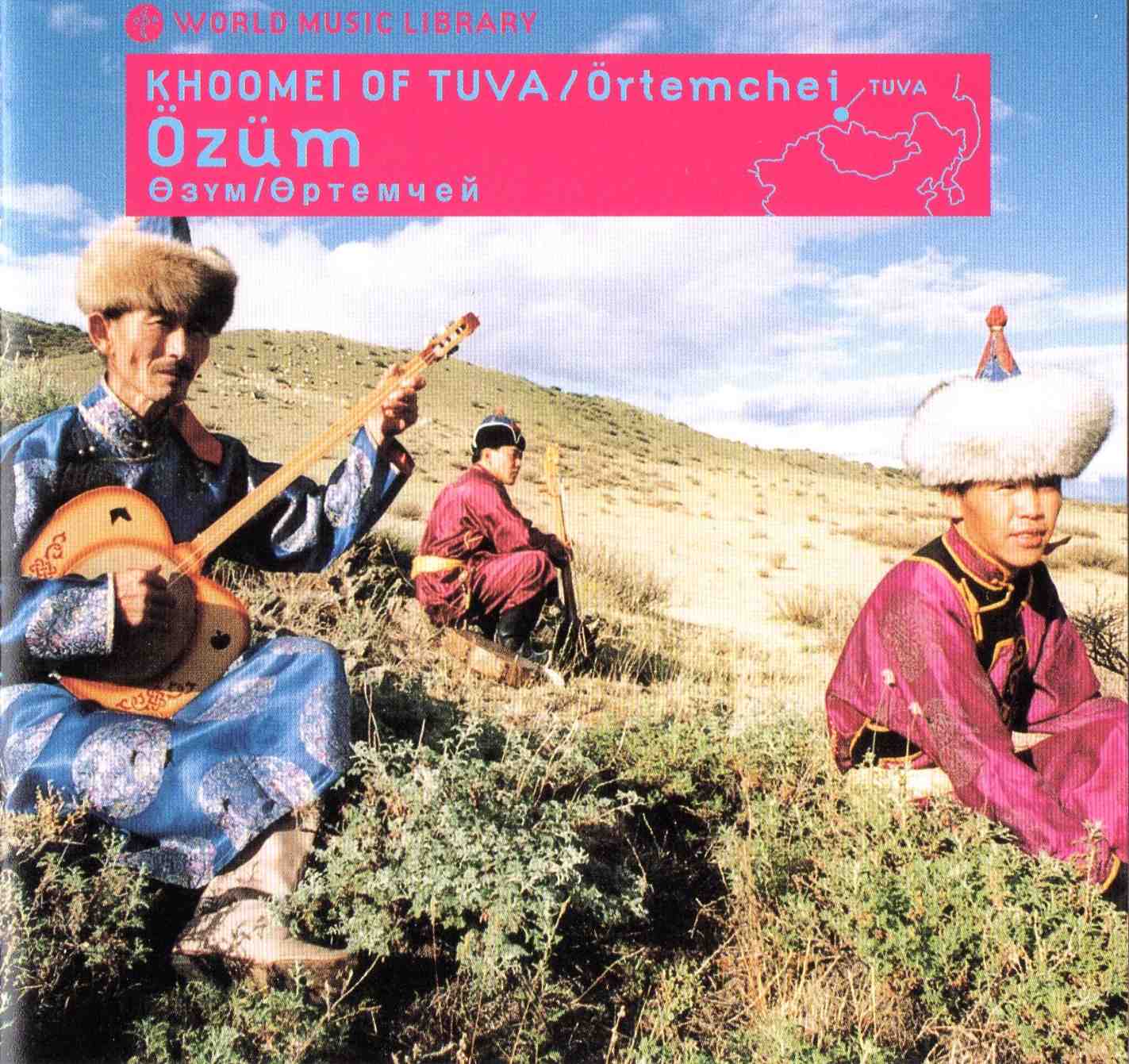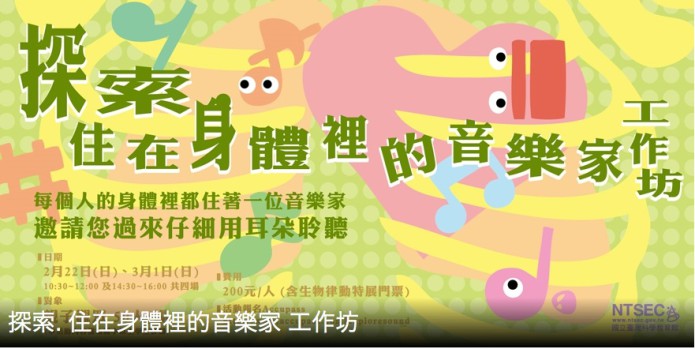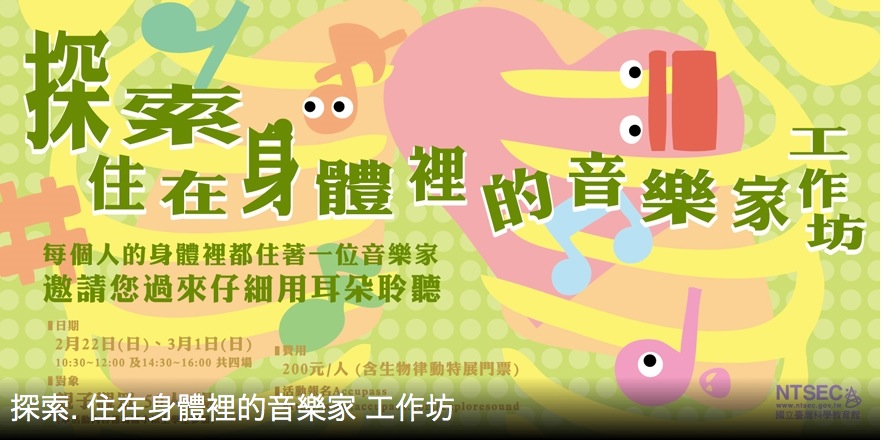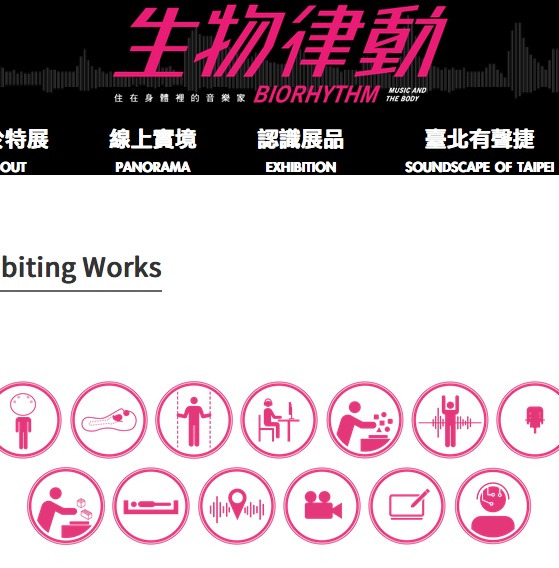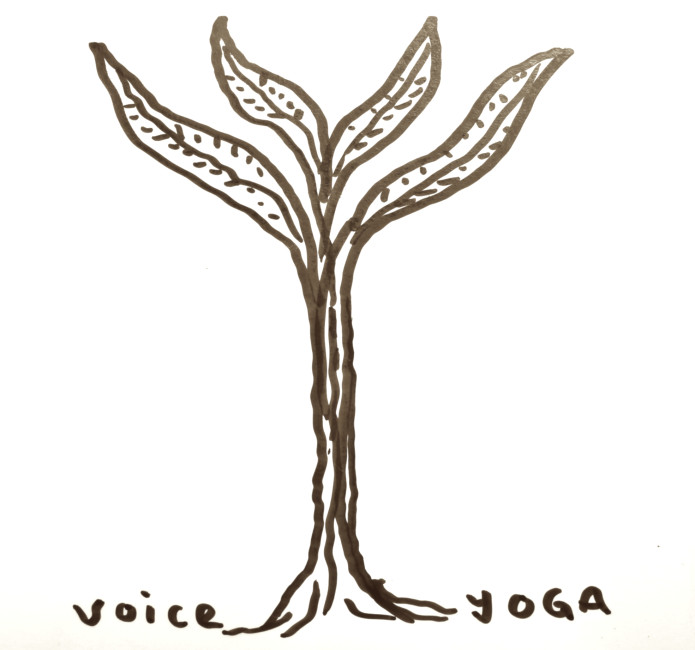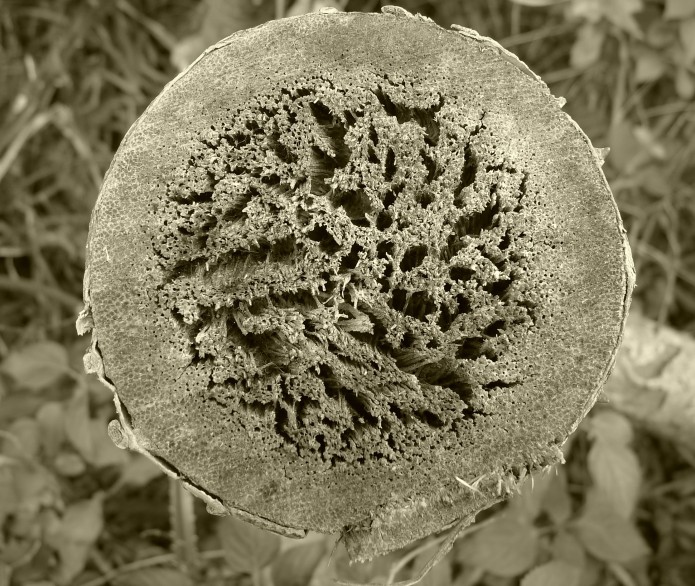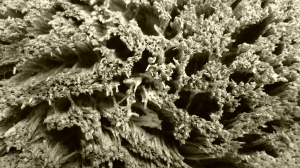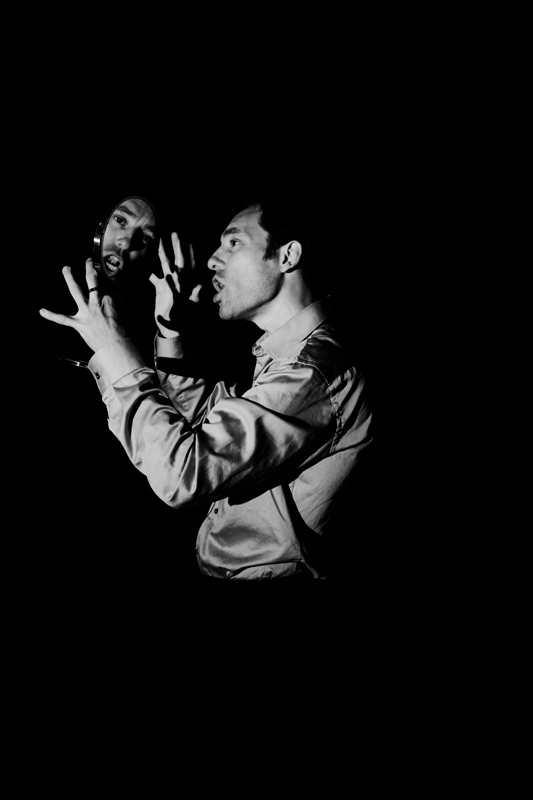workshops
Some pictures of Otkun and Choduraa’s visit
Photos from the workshop at Canjune’s Training Center by Mark:

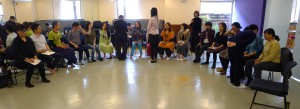
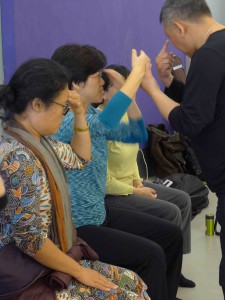
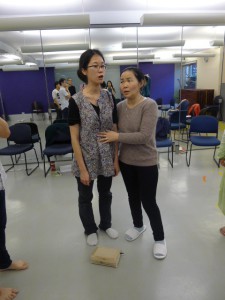
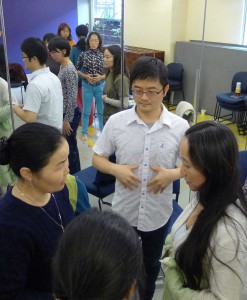
Photos from the concerts at Wistaria Teahouse by Ewan Kuo/郭育安 (edited by Mark):
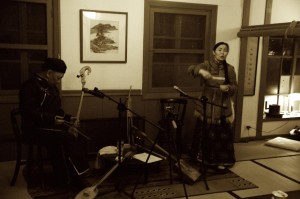
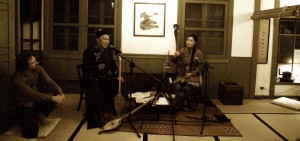
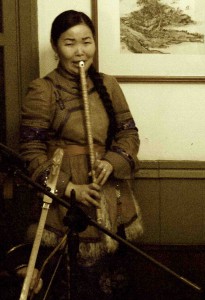
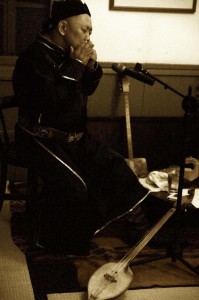
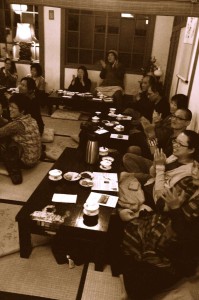
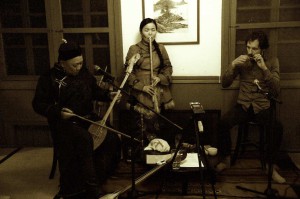
Photos from National Chengchi University’s Arts Center (by NCCU):
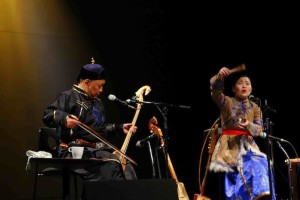
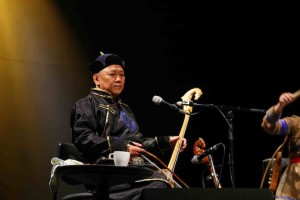

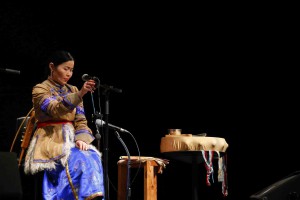
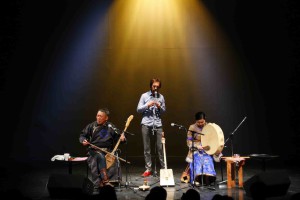

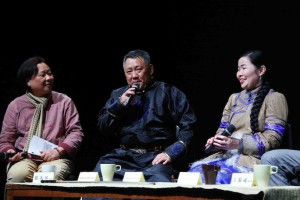

Hong Kong Workshop II
1-day workshop Inner Voice.
Workshop Tuvan Throat Singing (khoomei)
One-day workshop throat singing/Tuvan music and culture. With a male and female throat singer (Otkun Dostay/Choduraa Tumat). Check the blogpost and contact us for more details.
Festival Transverbal
A gong resounds on the groundfloor of a spa. Through the mezzanine situated at the spa’s glass façade, its sound waves travel to the basement, where a voice answers the gong. A multi-level dialogue begins, in more than one sense of the word. Instruments and voices, audience and performers mingle in a unique sound-space-event that tests the limits of music, mind & body.
Festival Transverbal is dedicated to the memory and legacy of the German multi-medial artist Michael Vetter, who passed away, aged 70, on December 7, 2013. It bridges an ongoing search for sound’s soothing inner secrets with its more expressive post-modern/avant-garde forms.
Expect voices, singing bowls, sheng (mouth organ), a gong, performers moving through the space, an immersive 60-minute sonic surrounding. Talk to or play with the musicians afterwards!
Through this Festival we keep alive the spirit and works of Michael Vetter, who inspired many musicians, artists, and other individuals along his extremely versatile and moving career in Europe and Asia. Michael Vetter had an incredible output of art works (starting at age 5); compositions, LPs/CDs; tours and performances; and educational methods for (experimental) flute, voice and instruments, among many other things. His musical career spanned the period from his late school years (early 1960s) until the months before his death (september 2013), when he worked on pieces by Karlheinz Stockhausen that many musicians have played and performed piecemeal, while none really gave them a try in their entirety. Thus, shortly after his death, Natascha Nikeprelevic, Vetter’s foremost successor, and Stockhausen Verlag worked on the publication of Expo, one of Stockhausen’s scores with pluses and minuses (+ -) as guiding points. Vetter recorded it with Nikeprelevic and FX Randomiz 8 weeks before he passed away. (The CD appeared in May of this year, listen here).
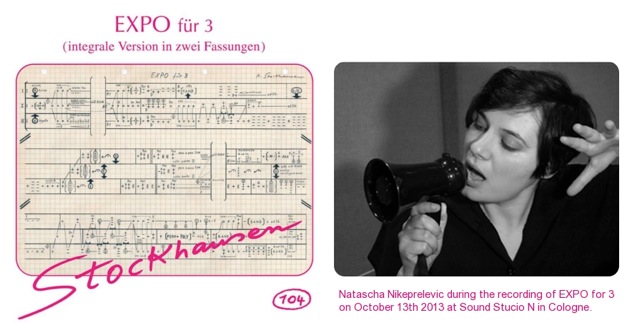
Michael Vetter’s visit to Taiwan, together with Natascha Nikprelevic, left a great impression on those who had the chance to see/hear them or work with them, during their residency at the Taipei National University of Arts, where Chung Minder from the Theatre Department invited them.
Michael Vetter always straddled the paths outside clear-cut styles, usually combining elements from here and there, and most of all relying on his own experimental genius to create fresh insights and sounds at every moment. His long-time affiliation with zen in Japan and outspoken zen themes in the 1980s aliened him from some of his former avant-garde colleagues, who shied away from (or were not interested in) anything to do with Eastern “spirituality”. However, looking back on his life in its entirety, it is clear that Vetter was dedicated to creative imagination and disciplined, daily musical and artistic rituals, above anything else. For Vetter, the world itself was constantly exploding with creation, unfolding, coming-into-existence, into a myriad forms, colours, sounds. He observed this world with intelligence, humor, commitment and compassion. His love and dedication to the arts and existence (‘Dasein’) as a whole was the starting point for his creative response to them. Or rather, it seemed he was able to let creative forces take their course through him, as a critical, subtle moderator.

Michael Vetter making Indian ink drawings, Academia Caparaia, Italy, 2009
It is in this spirit of capturing the uniqueness of every meeting (between performers, with a certain space and with a certain audience, at a given time) that we want to inaugurate a Festival which we hope to repeat in following years.
We prepared this Transverbal Festival in collaboration with Canjune Spa and Nicole’s Creative agency. It will be held on Sunday, November 16 at Canjune Spa. There are two identical concerts, you can join us either in the afternoon (3 PM) or in the evening (7 PM). The participants are Hans de Back, Lu Chi-Chung and Lee Wei-Lin, Li Li-Chin and Mark van Tongeren, and probably a few more musical assistants.
For more information and tickets, please follow this link to accupass.
Limited number of tickets!
Please also note that there will be a limited number of seats in the space, and limited storage space for your bags. Do not bring your own food/drinks.
We believe this concert will be less suitable for young children.
Musical pearls from Tuva in Taiwan
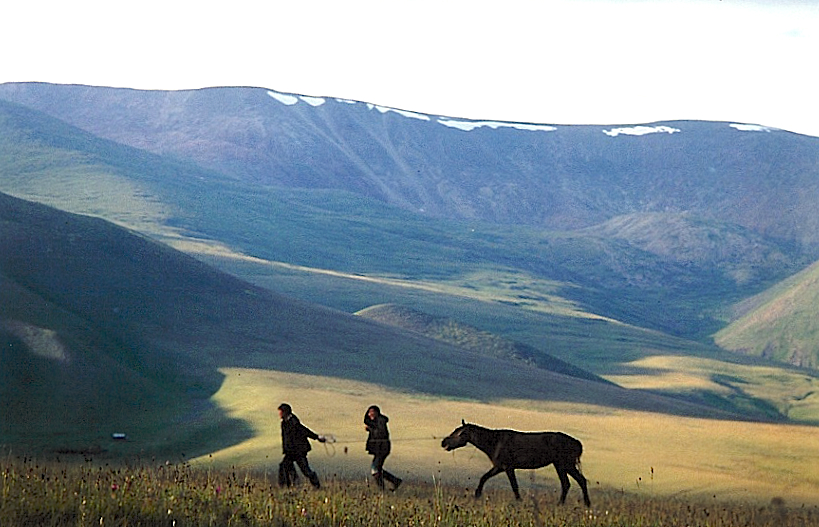 本活動中文詳細資訊請見本信下方說明。TuvanPearls EDM:
本活動中文詳細資訊請見本信下方說明。TuvanPearls EDM:
In April two excellent musicians and friends from Tuva are coming to Taiwan, so that people here can get better acquainted with this fascinating musical culture from the North. Get to know Tuvan music and culture and learn throat singing directly from established, original masters!
be amazed by Tuva’s signature sounds of throat singing
hear the beats of the shaman drum and Jew’s harp
resonate with the buzzing strings of horse-head fiddles and lute
get blown away by flutes from the steppe
THE PROGRAM FROM APRIL 11 TO 13
Saturday April 11, 19:30 Concert Pearls from Siberia, at Wistaria Teahouse.
Donation-based. Very limited seats!
 At Wistaria, an atmospheric original Japanese building, you will be seated on tatami mats. The concert is purely acoustic, so you can enjoy the sounds directly with your own ears. An excellent way to get to know the amazing acoustic world that Tuvans have developed over the centuries. Tuva’s auditory culture has become an icon in the last two decades for its remarkable throat singing techniques, which they share with Mongolia. Choduraa Tumat and Otkun Dostay both perform seveal throat singing techniques, which you will be able to hear at close range: the soft, light technique called khöömei, the whistle-like sygyt and the thundering low kargyraa. In Tuva we also find the horse-head fiddle (igil) and erhu-like fiddle (byzaanchy), lutes (doshpuluur, chanzy) and flute (shoor), the Jew’s harp (khomus) and the shaman’s drum (dunggur), among others. Choduraa Tumat and Otkun Dostay master many of these and will play tunes and pieces from different regions and times in Tuva. Songs and pieces will be alternated with stories about and from Tuva and its rich musical folklore. The only public Tuvan concert in a very special intimate setting!
At Wistaria, an atmospheric original Japanese building, you will be seated on tatami mats. The concert is purely acoustic, so you can enjoy the sounds directly with your own ears. An excellent way to get to know the amazing acoustic world that Tuvans have developed over the centuries. Tuva’s auditory culture has become an icon in the last two decades for its remarkable throat singing techniques, which they share with Mongolia. Choduraa Tumat and Otkun Dostay both perform seveal throat singing techniques, which you will be able to hear at close range: the soft, light technique called khöömei, the whistle-like sygyt and the thundering low kargyraa. In Tuva we also find the horse-head fiddle (igil) and erhu-like fiddle (byzaanchy), lutes (doshpuluur, chanzy) and flute (shoor), the Jew’s harp (khomus) and the shaman’s drum (dunggur), among others. Choduraa Tumat and Otkun Dostay master many of these and will play tunes and pieces from different regions and times in Tuva. Songs and pieces will be alternated with stories about and from Tuva and its rich musical folklore. The only public Tuvan concert in a very special intimate setting!
As a donation we suggest 500 NT$ for the perfomance, tea and a snack. Call Wistaria and leave your name and number for a seat: (02)2363-7375 or register here.
This event is sponsored by Wistaria.
Sunday April 12, 10-17 1-day workshop Tuvan throat singing and culture, at Canjune Training Center
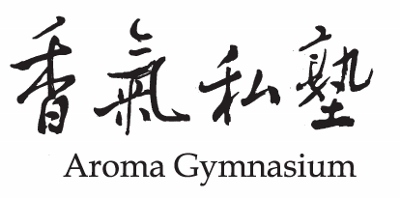 Learn to sing khöömei, sygyt and/or kargyraa with Otkun Dostay and Choduraa Tumat. The one-day Throat Singing workshop will have not just one, but two expert throat singers, including a female throat singer. A rare opportunity to learn the three basic Tuvan styles of throat singing: khöömei, sygyt and kargyraa, which tend to be a little softer and therefore easier than the Mongolian counterpart. During the day you will learn about Tuvan music and culture and get plenty of chance to hear throat singing and try it for yourself. With a maximum of 15 students (plus perhaps a few listeners), there is a chance to get personal feedback from Choduraa or Otkun for everyone. About half the time will be devoted to throat singing, the other half to other music and culture of Tuva.
Learn to sing khöömei, sygyt and/or kargyraa with Otkun Dostay and Choduraa Tumat. The one-day Throat Singing workshop will have not just one, but two expert throat singers, including a female throat singer. A rare opportunity to learn the three basic Tuvan styles of throat singing: khöömei, sygyt and kargyraa, which tend to be a little softer and therefore easier than the Mongolian counterpart. During the day you will learn about Tuvan music and culture and get plenty of chance to hear throat singing and try it for yourself. With a maximum of 15 students (plus perhaps a few listeners), there is a chance to get personal feedback from Choduraa or Otkun for everyone. About half the time will be devoted to throat singing, the other half to other music and culture of Tuva.
We aim at a 50/50 divide of male/female voices. The workshop is held in English/Russian with Chinese translation. Mark will be there to help translate Russian-English, if needed.
If you are interested and want to reserve a place, you can call or write Mark (mark@fusica.nl, 0910382749) or Wu Wentsui (wuwentsui@gmail.com, 0928867512).
This event is sponsored by Canjune.
Monday April 13, 19:30-21:30 Concert Tuvan music and culture. National Chengchi University, Arts and Culture Center, Audiovisual Theatre
![]() This presentation features introductions, videos about the beautiful, unknown land of Tuva, a display of many styles of throat singing and different musical instruments. Choduraa Tumat and Otkun Dostay both perform seveal throat singing techniques: the soft, light technique called khöömei, the whistle-like sygyt and the thundering low kargyraa and other substyles. They will also present a selection of pieces and instruments found in Tuva, such as the horse-head fiddle (igil) and erhu-like fiddle (byzaanchy), lutes (doshpuluur, chanzy) and flute (shoor), the Jew’s harp (khomus) and the shaman’s drum (dunggur). Choduraa Tumat and Otkun Dostay master many of these. Songs and pieces will be alternated with stories about and from Tuva and its rich musical folklore. Afterwards there is a chance to talk to the musicians during the Q&A.
This presentation features introductions, videos about the beautiful, unknown land of Tuva, a display of many styles of throat singing and different musical instruments. Choduraa Tumat and Otkun Dostay both perform seveal throat singing techniques: the soft, light technique called khöömei, the whistle-like sygyt and the thundering low kargyraa and other substyles. They will also present a selection of pieces and instruments found in Tuva, such as the horse-head fiddle (igil) and erhu-like fiddle (byzaanchy), lutes (doshpuluur, chanzy) and flute (shoor), the Jew’s harp (khomus) and the shaman’s drum (dunggur). Choduraa Tumat and Otkun Dostay master many of these. Songs and pieces will be alternated with stories about and from Tuva and its rich musical folklore. Afterwards there is a chance to talk to the musicians during the Q&A.
 The concert at NCCU is free and open for everyone. Just register here. Without reservation there may still be places when you come, there is no guarantee but there are 300+ seats.
The concert at NCCU is free and open for everyone. Just register here. Without reservation there may still be places when you come, there is no guarantee but there are 300+ seats.
This event is sponsored by the Mongolian and Tibetan Affairs Commission in Taiwan.
THE MUSICIANS
Otkun Dostay
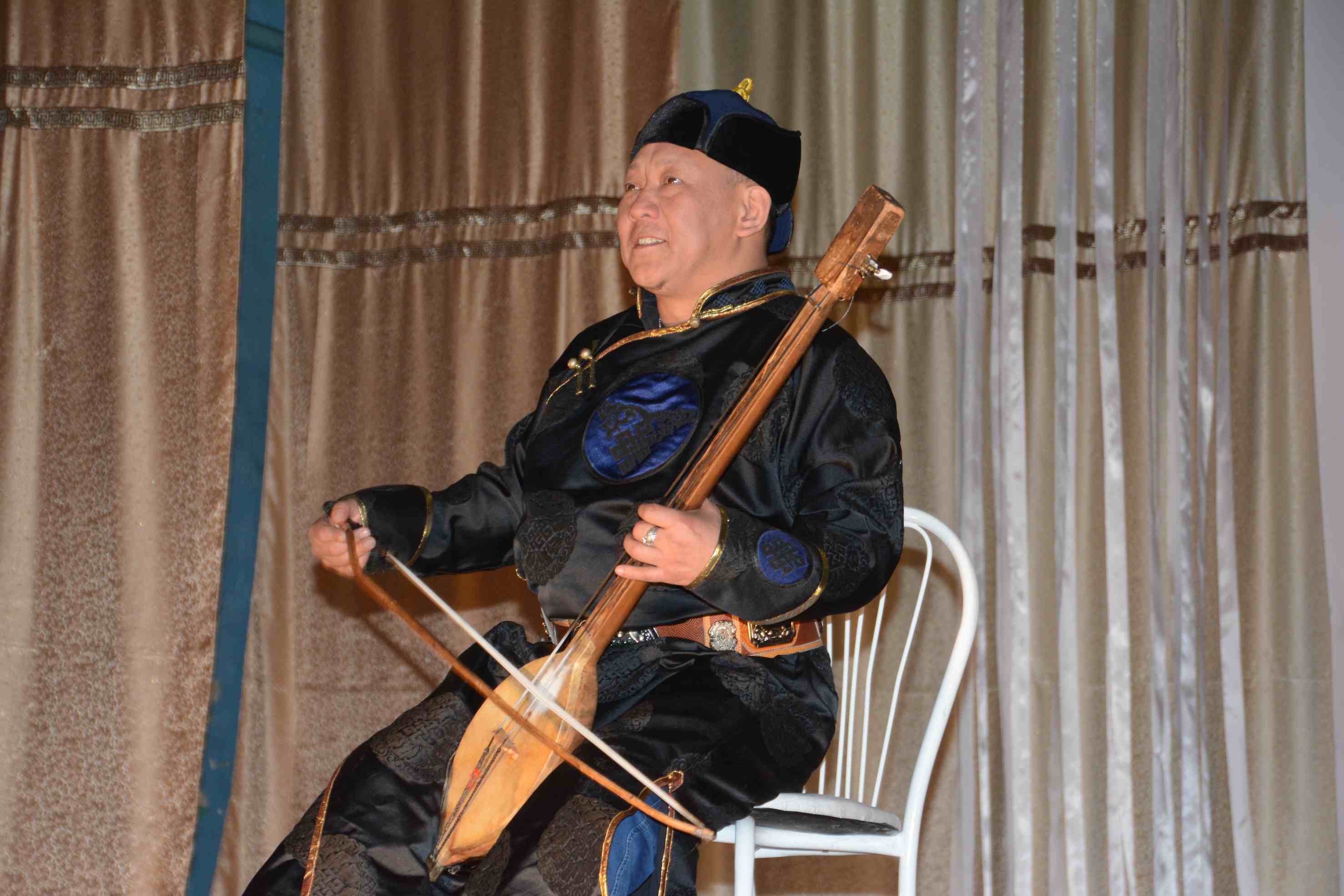 In the late 1980s Dostay was the youngest member of the internationally acclaimed Tuva Ensemble. During the late Soviet era he enrolled a theatre school in Leningrad (now Sint-Petersburg), and was engaged in acting, dancing and storytelling. With fellow students Stanislav Iril and Olaak Ondar he took part in Buddhist ceremonies in Leningrad and founded the group Özüm (‘sprouts’). They recorded their first CD in 1991, published by Window to Europe/Orpheus. Dostay has continued to direct Özüm with changing group members over time. He plays horse-head fiddle, all the Tuvan varieties of Jew’s harp and the shaman’s drum. He organised festivals to commemorate the great throat-singer Gennadi Tumat in his native village Khandagayti. He is currently active as the founder-director of the Tuvan-Japanese friendship Center and works as a correspondent for Tuvan State Radio, under the State TV & Radio Company. He regularly performs in solo, duo and ensemble projects, which he toured in Germany, Italy, Norway, The Netherlands, Belgium, Finland, Sweden, Denmark, Morroco, Japan and China. He has been involved in recording, producing and playing on several CDs of Tuvan music published in Russia, Japan and Europe. In 2013 he published his first solo CD, an exciting mix of traditional songs and melodies with 21st-century sounds.
In the late 1980s Dostay was the youngest member of the internationally acclaimed Tuva Ensemble. During the late Soviet era he enrolled a theatre school in Leningrad (now Sint-Petersburg), and was engaged in acting, dancing and storytelling. With fellow students Stanislav Iril and Olaak Ondar he took part in Buddhist ceremonies in Leningrad and founded the group Özüm (‘sprouts’). They recorded their first CD in 1991, published by Window to Europe/Orpheus. Dostay has continued to direct Özüm with changing group members over time. He plays horse-head fiddle, all the Tuvan varieties of Jew’s harp and the shaman’s drum. He organised festivals to commemorate the great throat-singer Gennadi Tumat in his native village Khandagayti. He is currently active as the founder-director of the Tuvan-Japanese friendship Center and works as a correspondent for Tuvan State Radio, under the State TV & Radio Company. He regularly performs in solo, duo and ensemble projects, which he toured in Germany, Italy, Norway, The Netherlands, Belgium, Finland, Sweden, Denmark, Morroco, Japan and China. He has been involved in recording, producing and playing on several CDs of Tuvan music published in Russia, Japan and Europe. In 2013 he published his first solo CD, an exciting mix of traditional songs and melodies with 21st-century sounds.
Choduraa Tumat
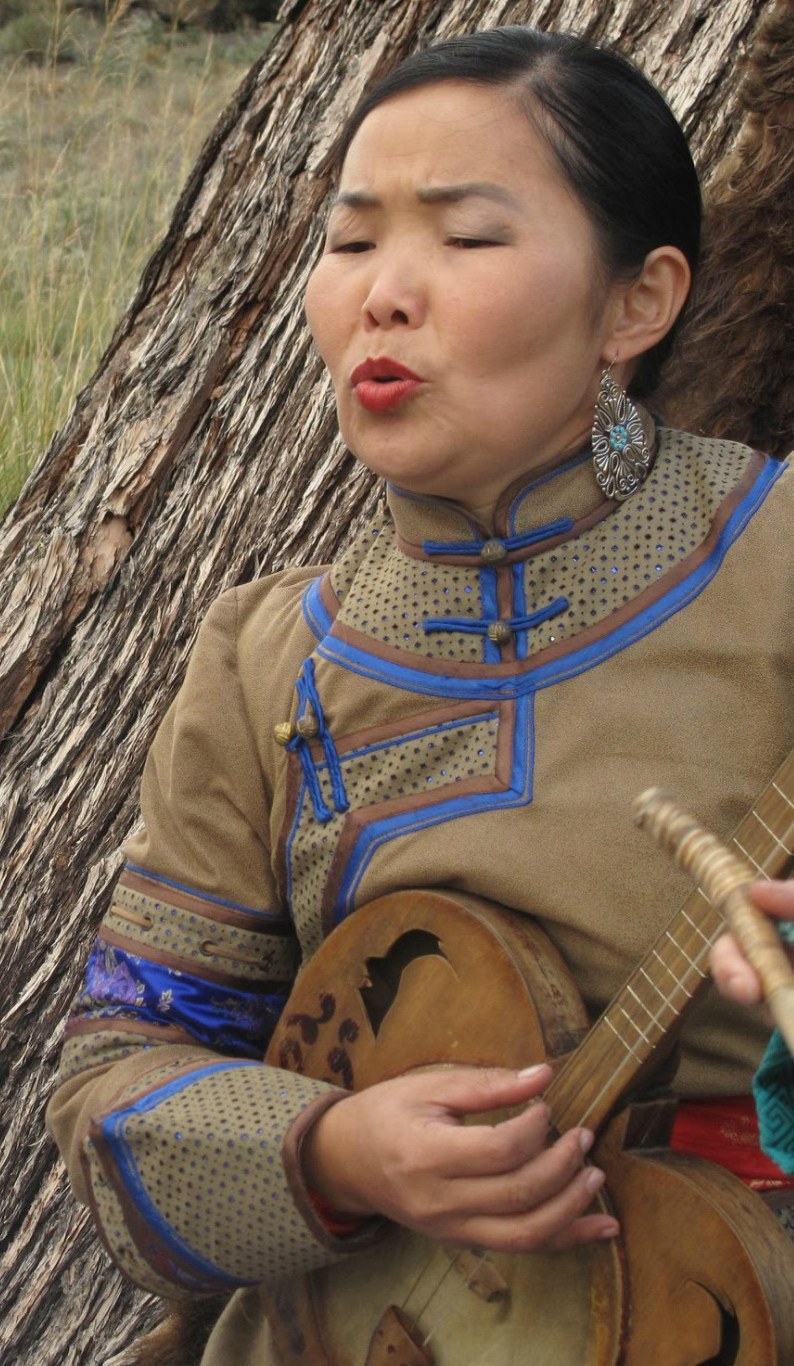 Born in Western Tuva, as a girl Tumat was fond of listening to khoomei and sygyt throat singing performed by her brothers. She studied traditional music in music college in Tuva and went on to become one of the world’s most active female overtone/throat singers, as well as the founder and artistic leader of the all-female throat-singing folk ensemble Tyva Kyzy (‘Daughters of Tuva’, www.tyvakyzy.com). She is an accomplished performer of all basic throat-singing styles, sings traditional folk songs, and plays various Tuvan string instruments, Jew’s harps and zither. As a performer, she received many titles in Tuva. She is a teacher of traditional music and khöömei throat-singing at the Pedagogical College of Tuvan State University in Tuva’s capitol Kyzyl. With Tyva Kyzy and with solo projects she toured extensivly in the USA, Poland, Russia, Spain, Portugal, France, Germany, the Netherlands, Finland, Norway, Sweden, Denmark and Japan. She recorded and released several CDs and DVDs, among which her outstanding solo CD Belek/ The Gift.
Born in Western Tuva, as a girl Tumat was fond of listening to khoomei and sygyt throat singing performed by her brothers. She studied traditional music in music college in Tuva and went on to become one of the world’s most active female overtone/throat singers, as well as the founder and artistic leader of the all-female throat-singing folk ensemble Tyva Kyzy (‘Daughters of Tuva’, www.tyvakyzy.com). She is an accomplished performer of all basic throat-singing styles, sings traditional folk songs, and plays various Tuvan string instruments, Jew’s harps and zither. As a performer, she received many titles in Tuva. She is a teacher of traditional music and khöömei throat-singing at the Pedagogical College of Tuvan State University in Tuva’s capitol Kyzyl. With Tyva Kyzy and with solo projects she toured extensivly in the USA, Poland, Russia, Spain, Portugal, France, Germany, the Netherlands, Finland, Norway, Sweden, Denmark and Japan. She recorded and released several CDs and DVDs, among which her outstanding solo CD Belek/ The Gift.
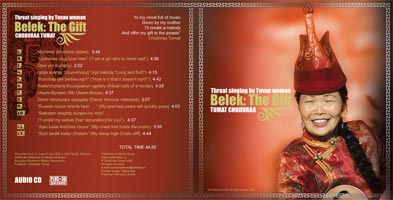
《西伯利亞溫暖的靈魂之聲》2015 台灣
聆聽薩滿擊鼓的節律和口簧琴彈出的音場
與琵琶和馬頭琴琴弦嗡嗡的共振
圖瓦傳奇的喉音叫人驚艷
讓草原的哨音將你吹往他方
本系列活動邀請兩位圖瓦喉音大師來台,讓您聆聽北方草原音樂之美並直接向大師學習道地的喉音,認識圖瓦傳統音樂與文化!
《圖瓦的女兒》Tyva Kyzy 主唱楚都拉.圖瑪特 (Chodurra Tumat)
《圖瓦樂團》Tuva Ensemble 歐特昆.都斯泰(Otkun Dostay)
今年四月為您帶來西伯利亞圖瓦共和國傳奇的「呼麥」喉音演唱與工作坊
《泛音歌唱》Overtone Singing作者與【共鳴】泛音課程教師及表演者Mark van Tongeren 馬克.范.湯格鄰策劃
本系列活動更多詳情及最新資訊請見:www.fusica.nl ; https://fusica.wordpress.com
活動聯絡信箱:mark@fusica.nl 連絡人 Mark / chichenlyv@gmail.com 李小姐
【喉音簡介】
俄羅斯境內的圖瓦共和國(Republic of Tuva)位於西伯利亞南部,與蒙語毗鄰,以具特色的喉音(throat singing)音樂引起全球音樂界的注意。著名的音樂家Sainkho Namtchylak就曾多次到台灣演出,以圖瓦音樂吟唱與爵士樂、電子樂等前衛即興音樂結合,讓台灣聽眾認識圖瓦傳統音樂的多樣性。
喉音,又名呼麥(khoomei),最讓聽者驚豔的是能在一個演唱者的聲音中聽見高音與低音兩個聲部。圖瓦的喉音伴隨傳統樂器馬頭琴(igil)、琵琶(doshpuluur)、胡琴(byzaanchy)等,將圖瓦傳統音樂流傳至世界各地。
圖瓦喉音大致區分為以下幾種,包括khoomei(呼麥)、kargyraa(卡基拉)、sygyt(西奇)、chylandyk(蟋蟀鳴聲)、dumchuktaar(鼻音卡基拉)、ezengileer(馬鐙式唱法)、borbangnadyr(流水滾動音)等。此次獲邀來台表演的兩位音樂家楚都拉.圖瑪特Choduraa Tumat與歐特昆.都斯泰Otkun Dostay精於傳統圖瓦曲調、樂器演奏與喉音的各種技巧。楚都拉善於低沉的卡基拉與高音的西奇哨音。歐特昆則習於以內斂有致的呼麥演唱。
除了精湛的喉音,二人也精通各種傳統樂器。歐特昆演奏的樂器包含馬頭琴、雙弦琵琶 、薩滿鼓(dunggur)。楚都拉彈箏(chadagan)、拉奏雙弦胡琴、也吹奏橫笛(shoor)和口簧琴(khomus)。他們的音樂表演類型涵蓋圖瓦草根音樂、現代實驗音樂、長敘事曲、快板小調、傳統搖籃曲、民謠及召喚草原的樂器演奏。
【音樂家介紹】
Choduraa Tumat 楚都拉.圖瑪特
《圖瓦的女兒》女子喉音團體的團長楚都拉,1974年生於圖瓦共和國的Lyme小鎮,自小聽兄長唱呼麥及西奇,耳濡目染下喜歡上喉音。 女性喉音在圖瓦被視為禁忌,身為女性喉音演唱家,楚都拉勇敢地推動女性喉音,成立《圖瓦的女兒》女子喉音團體打破女性不得學習喉音演唱的傳統禁忌 。楚都拉為圖瓦的全才型藝術家,精通喉音中的各種技巧如繞富韻致的呼麥、低沉的卡基拉、高繞的西奇哨音、和如騎馬般充滿節律性的馬鐙唱法 ,曾獲邀至法國、德國、日本、芬蘭、瑞典、西班牙等地演出。楚都拉亦著力傳承喉音,在圖瓦多所大學及兒童音樂學校執教,推廣女性喉音。
Otkun Dostay 歐特昆.都斯泰
1970年生於圖瓦Khandagaity小鎮,為知名喉音演唱與馬頭琴表演者,亦是著名圖瓦民族音樂團體《圖瓦樂團》Tuva Ensemble的一員,於音樂上有卓越的成就,不斷受邀至日本、土耳其及荷蘭等地演出。歐特昆一直以來致力於圖瓦傳統音樂的傳承與創新,舉辦圖瓦喉音國際音樂節《Övur之地—西奇與呼麥》(Sygyt and khoomei in the land of Övur)。他不僅擔任全女子喉音團體《圖瓦的女兒》的經紀人,同時也在電視台製作音樂節目,極力推廣傳統音樂。目前於圖瓦的聯合國教科文組織UNESCO部門擔任主席。
紫藤廬喉音茶會
喉音與茶色的相遇
圖瓦傳統曲調與樂器演奏。曲目含口簧琴、搖籃曲、家鄉的名字、牧民之歌、薩滿鼓之即興、卡基拉與呼麥演唱。聽茶和人聲於喉頭間悠轉。
時間:2015.4.11 (週六)19:30-21:00(19:00 開放觀眾入座)
地點:紫藤廬(台北市大安區新生南路三段16巷1號)
音樂會採登記報名:請電洽紫藤廬(02)2363-7375 留下您的姓名電話完成報名
*本場次名額有限請儘快報名!
現場每人酌收活動費用 500 元,贊助音樂家演出及當日茶點供應。
贊助單位:紫籐廬
網址:http://www.wistariateahouse.com
「呼麥」喉音與圖瓦音樂工作坊
直接向難得的喉音女聲楚都拉.圖瑪特與喉音教學經驗豐富的歐特昆.都斯泰兩位圖瓦喉音大師學習道地的喉音,並從此認識圖瓦音樂與文化!
【上課內容】
圖瓦文化影片放映。介紹圖瓦語言中影響喉音發音口形的低母音及高母音。喉嚨暖身。學習圖瓦傳統民謠。
《學習喉音的三種技巧》
呼麥(khöömei)—可說是喉音的基礎,內斂的技巧唱出涵雅有致的泛音旋律。
西奇(sygyt)—如鳥鳴般具有穿透力的高哨音。
卡基拉(kargyraa)—不可思議的低音創造出豐富的泛音合聲,一個人唱出廣闊的音場!
成果呈現及分享。
【師資】
《圖瓦的女兒》Tyva Kyzy 主唱楚都拉.圖瑪特 (Choduraa Tumat)
《圖瓦樂團》Tuva Ensemble 歐特昆.都斯泰(Otkun Dostay)
時間:2015.4.12(週日)10:00-17:00 (中間一小時休息)
地點:肯園香氣私塾教室(台北市復興南路二段151巷3號4樓)*近捷運「科技大樓」站
報名請洽:0928-867-512 / wuwentsui@gmail.com 連絡人:吳小姐
工作坊採小班制,名額有限請搶先報名!
課程更多詳情及最新消息公佈請見:www.fusica.nl ; https://fusica.wordpress.com
來自圖瓦的呼喚
政大呼麥音樂會
國立政治大學民族學系與斯拉夫語文學系聯合邀請
於政大藝文活動中心共同諦聽來自西伯利亞的呼喚!
《表演者》
《圖瓦的女兒》Tyva Kyzy 主唱楚都拉.圖瑪特 (Choduraa Tumat)
《圖瓦樂團》Tuva Ensemble 歐特昆.都斯泰(Otkun Dostay)
《節目內容》
圖瓦傳統曲調與口簧琴、馬頭琴、琵琶、胡琴、橫笛等傳統樂器演奏、幾種喉音技巧示範、搖籃曲、對家鄉的召喚、「我不會放棄唱我的呼麥」、卡基拉與呼麥演唱、薩滿鼓與人聲即興。
*本音樂會活動含圖瓦傳統音樂與文化短片介紹暨演後交流。由政大民族學系藍美華老師主持,現場邀請民族音樂學專家馬克.范.湯格鄰介紹圖瓦音樂傳統,將遙遠的草原音樂傳送到台灣!
時間: 2015.4.13 (週一)19:30-21:30(19:00開放入場)
地點:政大藝文活動中心3F視聽館
活動對外開放報名 現場採自由入座。
(備取或未報名者於現場排候補入座。)
報名網址: http://moltke.cc.nccu.edu.tw/Registration
政大首頁/點擊右上角「訪客」進入「聯合報名系統」/搜尋「來自圖瓦的呼喚」
活動於開演前三週開放報名。
洽詢電話: (02)2939-3091 分機 63394 張小姐
主辦單位:國立政治大學民族學系、斯拉夫語文學系
協辦單位:蒙藏委員會、政大藝文中心
Make-a-noise-class for parents and kids (7+)
Sunday February 22 and Sunday March 1, 2015 I will lead a dazzling interactive workshop about sound, listening and the body. With lots of hands-on exercises for parents and kids to make and feel sound, electronic sound gadgets and spectacular visualizations of sound. If you have kids aged 7 and over and look for some holiday fun, join us during one of the four sessions. If you don’t have kids, it is still very worthwile for adults to come and check out the Biorhythm exhibition which was adapted from the one at the Science Gallery in Dublin, Ireland.
Click on the pic below and from there on the circles for more info on each exhibit.
I believe you do not have to buy a ticket in advance, but if you wish you can at accupass.
[youtube https://www.youtube.com/watch?v=G1w-KKN4Vrs?rel=0&w=960&h=720]
(video showing how sound propagates: “Moleculair vibrations and sounds” by B. Gelis, S Blatrix)
Here is the text from the original exhibition in Dublin:
What makes us dance? Why do we sing the blues? Could there be a formula for the perfect hit?
Over 65,000 people came to experience Science Gallery’s exploration of music and the body.
Music is a central part of the human experience, but what is the natural force that drives us to sing, strum, drum and dance? What is the scientific basis of whistling, humming and toe-tapping?
Cognitive scientist Steven Pinker recently claimed that music is “auditory cheesecake”, designed to tickle parts of our brain designed for more serious purposes like speech and abstract reasoning. Darwin, on the other hand, preferred to think that music and dance evolved as an integral part of human courtship rituals. George Bernard Shaw more racily described dancing as “the vertical expression of a horizontal desire”. Our brains, ears and vocal chords are exquisitely designed for enjoying and creating music.
From an acoustic bed to sonic tables and experiments on your emotional response to pop music, Science Gallery’s Summer exhibition BIORHYTHM will allow you to feel how music moves your body through an interactive bazaar of unique sonic experiences, installations, experiments and performances from musicians, engineers and neuroscientists from around the world.
CURATORIAL TEAM: singer Gavin Friday, composer Linda Buckley, Professor Ben Knapp of SARC at Queen’s University Belfast and Professor Ian Robertson of Trinity College Dublin and Michael John Gorman, Science Gallery.
BIORHYTHM is supported by the Department of Tourism, Culture and Sport, our founding partners Ulster Bank and the Wellcome Trust, the members of Science Circle: Dell, Google, ICON, Paccar, Pfizer and our media partner is the Irish Times. Thank you also to Sennheiser and Roland Ireland for their in-kind support of BIORHYTHM, and we are delighted to be joined by Phantom 105.2FM as our BIORHYTHM broadcast partner. Thank you also to DART/Irish Rail for their ongoing support.
About Voice Yoga
Voice Yoga consists of a series of exercises that gives pride of place to the voice as a central, creative force in our lifes. Our existence depends in important ways on our speaking, listening, sounding and singing abilities. The class promotes awareness of the many roles of the voice in our daily lives. It expands our creative vocabulary, without necessarily talking about music, the singing voice or any musical style. The point is not so much to learn any specific new technique: we play with the voice in a lot of different ways and listen with fresh ears to the hidden potential of our voices.
In Voice Yoga, sound, silence and resonance become a mirror for the self. The sounds produced by ourselves, allows us to ‘see’ ourselves more clearly, to hear what’s living deep inside us. In ever-growing cycles of creating and perceiving we learn about music and sound, about ourselves and about the environment.
Structure of the classes
We usually start with silence, breath and body movements to turn away from our busy mind into the body and to the sensations we actually experience. We let the voice come out of a natural breath flow. We listen to and follow its natural resonances. We do not try to sing in an artful way, but to experience how body-mind-voice are intimately connected, and how voice and resonance can serve as a bridge to overcome the dualistic notion of body <> mind. From then on, all kinds of styles and genres of vocalising and musicking may happen, some structured, some wild, some giving insight in your voice, some therapeutic. Exercises are based on yoga, musical and theatrical techniques, vipassana meditation and our innate love to play like children.
The idea behind Voice Yoga is comparable to yoga and tai-chi: the effect of the exercises is gradual. We believe that only with repeated classes you can really learn to connect the energies of voice & sound with the whole of your body and mind. You slowly become more and more familiar with your voice and its powers; you will begin to hear and feel things you did not hear and feel before. That’s why we suggest you to sign up for four classes a time after your trial class.
The teacher
Voice Yoga is designed and taught by Mark van Tongeren, who brings with him 25 years of experience in working with sound, music and theatre and many different cultures.
 In my Voice Yoga Review of 2014 you can read about some recent experiences:
In my Voice Yoga Review of 2014 you can read about some recent experiences:
https://fusica.wordpress.com/2014/12/30/voice-yoga-2014-re-view/
For whom
For those seeking to enrich their voices, let off steam and unlock their hidden creative potential. For singers and those who are afraid to sing. For actors, musicians and other artists and professionals who work with sound. Perhaps more than anyone else, people who want to experience and learn about the therapeutical effects of sound seem to benefit from Voice Yoga. The human voice is a tool that assists human beings to produce a mirror-like reflection of the world around them in their minds. By gaining a deeper understanding and experience of the mechanisms of making sounds, words and music, and of listening, we gradually deepen the connections within ourselves (our body-minds) and with others and the world around us.
Dates and time
please look here for current dates and times (voice yoga dates 2015).
Prices
Every class lasts two hours. The price is 400 NT$ for a single class, and 1500 NT$ for four classes (375 NT$ per class). You do not have to attend four classes in a row; we’ll just tick off your presence four times and then you can sign up again for four times. Students and others with limited financial resources can get a reduced price: just send a message.
How to register
Feel free to join the Voice Yoga class any time. It is best to send a message every time you want to come, then we prepare a place for you. Write to mark at fusica dot nl or send a text-message to 09 10 48 27 49.
Place
Canjune Training Centre, 4th Floor, number 3 , Lane 151, Fuxing South Road, Section 2, (this is about 20 meters from the corner of FuXing South Road, go up the stairs to the hairdresser and take the elevator to 4F; if you’re early the streetdoor may be closed). Nearest MRT: Technology Building (10 min. walk). Telephone training centre: 02 – 27 00 72 91.
Voice Yoga dates 2014
In this class we use the voice in its immense richness, not only as a musical instrument, but as our primary tool to communicate and exist through/with/for/from sound. In Voice Yoga, sound, silence and resonance become a mirror for the self. The sounds produced by ourselves, allows us to ‘see’ ourselves more clearly, to hear what’s living deep inside us. In ever-growing cycles of creating and perceiving we learn about music and sound, about ourselves and about the environment. A ‘quintessence of science, sound and self’ as I called it in my book Overtone Singing.
DATES AND TIME FOR 2014
EVERY THURSDAY, 10-12 AM
[table colwidth=”100″ ]JANUARY,9/ 16/ 23/ 28
FEBRUARY,13/ 20/ 27
MARCH,6/ 13/ 27
APRIL,3/ 10/ 17/ 24
MAY,1/ 8/ 15/ 22/ 29
JUNE,5/ 12/ 19
AUGUST,21/ 28
SEPTEMBER,4/ 11/ 18/ 25
OCTOBER,2/ 9/ 16/ 23/ 30
NOVEMBER,6/ 13/ 27 [no class on November 20]
DECEMBER,4/ 11/ 18/ 25
[/table]
PLACE
Canjune Training Centre, 4th Floor, number 3 , Lane 151, Fuxing South Road, Section 2, (this is about 20 meters from the corner of FuXing South Road, go up the stairs to the hairdresser and take the elevator to 4F; if you’re early the streetdoor may be closed). Nearest MRT: Technology Building (10 min. walk). Telephone training centre: 02 – 27 00 72 91.
RESERVATION
Please notify us of your intention to join the class, by sending a text-message (SMS) with your name to 09-10 38 27 49.
For those unfamiliar with Voice Yoga, the information about Voice of Dao posted earlier still stands.
Upcoming events
Weekly Voice Yoga Returns to Canjune Training Centre
March 15: Underground Trip (performance)
March 29: Lacking Sound Festival (performance)
Voice workshop for spring 2014: coming up soon
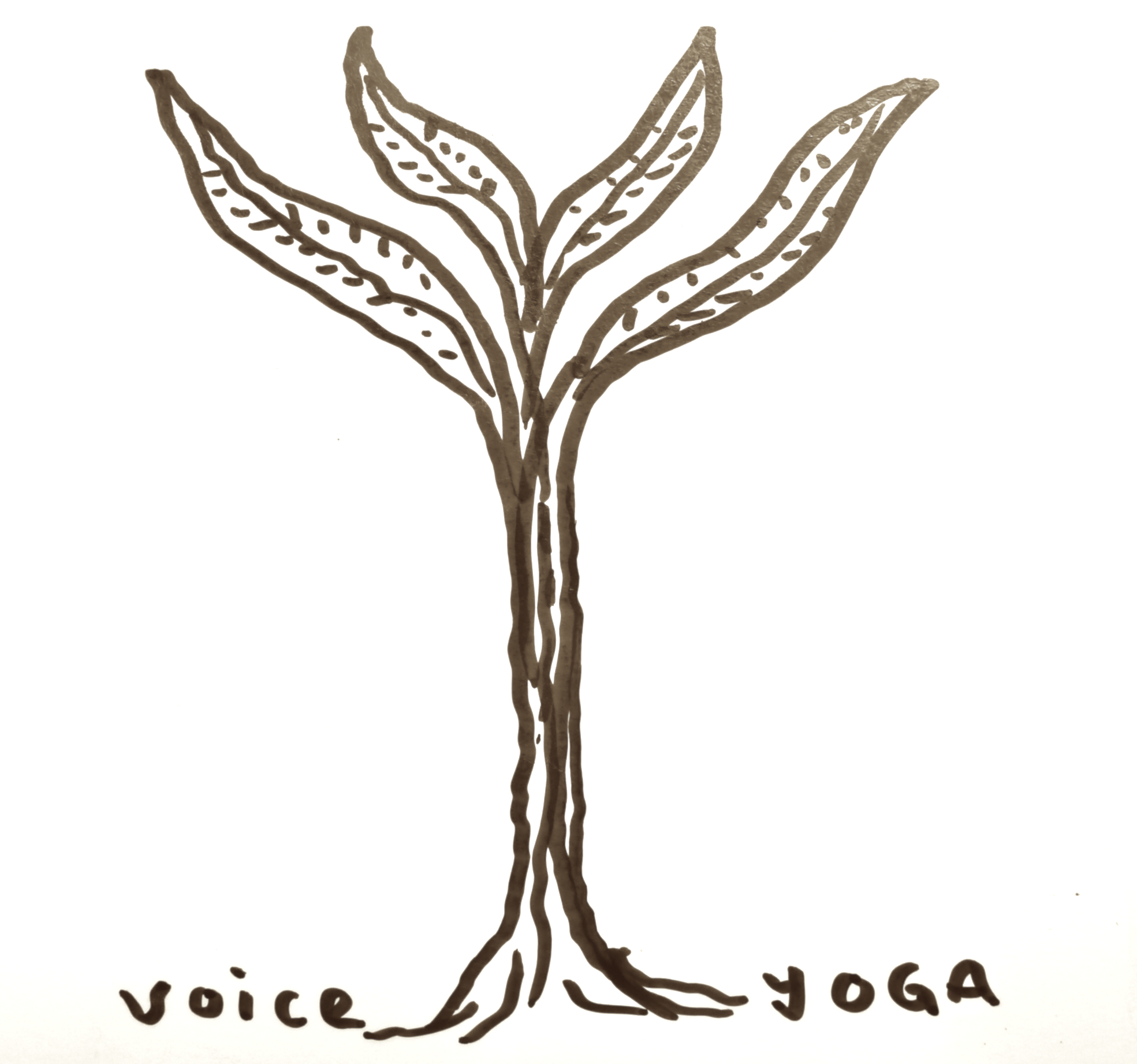
This week Voice Yoga returns to Canjune’s Training Centre. Everyone is welcome to try out Voice Yoga on Thursdays between 10 and twelve. No registration necessary, but please be on time. Next week (March 20) the class will shift to the afternoon, between 14 and 16. Read the details about Voice Yoga in this blogpost.
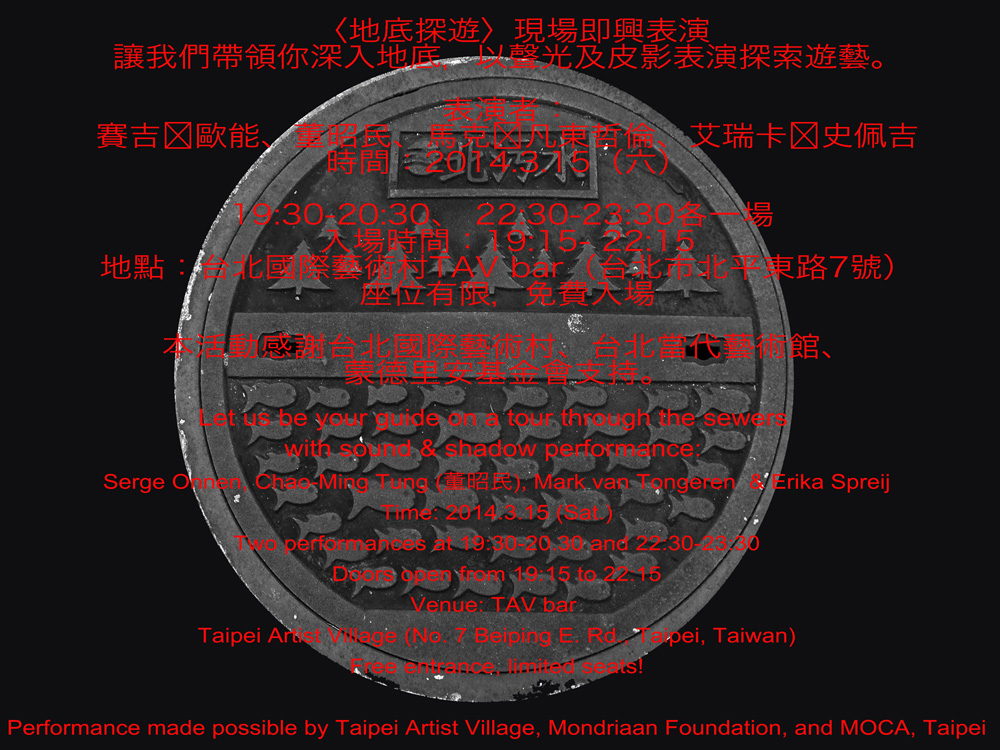
Saturday March 15 you are invited to the performance Underground Trip with Serge Onnen, Erika Sprey (visuals), Tung Chao-Ming and myself (sounds) at Taipei Artist Village. There are two shows, at 19:30 and 21:30, please find the details in my previous blogpost.

Saturday March 29 I am invited to perform at the Lacking Sound Festival, which is one of the more interesting on-going sound events in Taipei. Serge Onnen will join me to provide visuals, and we will explore the theme of mirrors. More details in this post.
Soon I will announce some workshops for this spring season. Come check back here or subscribe to this blog. If you prefer to receive emails write to < info at fusica dot nl> and you will receive updates every once in a while.


